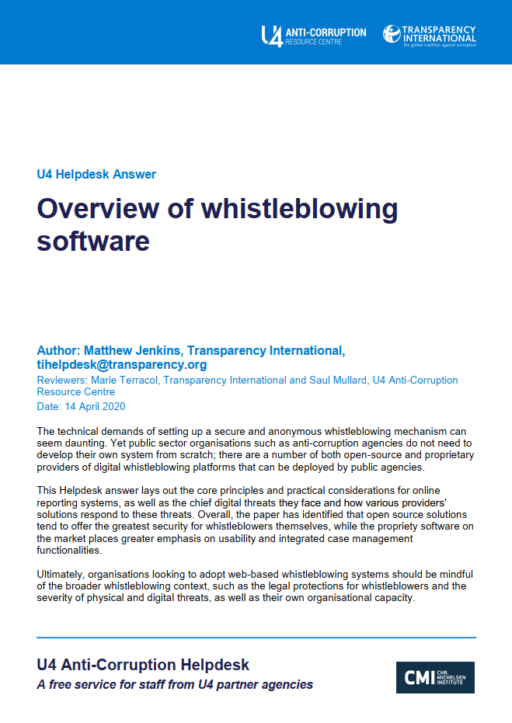
This Anti-Corruption Helpdesk brief was produced in response to a query from a U4 Partner Agency. The U4 Helpdesk is operated by Transparency International in collaboration with the U4 Anti-Corruption Resource Centre based at the Chr. Michelsen Institute.
Query
Please provide an overview of the most common web-based whistleblower systems, exploring their respective advantages and disadvantages in terms of anonymity, security, accessibility, costs and so on. We are particularly interested in systems that would be appropriate for Anti-Corruption Agencies.
Contents
- Background
- Core principles of an effective whistleblowing system
- Overview of providers
- Suitability for anti-corruption agencies
- References
Main points
- Whistleblowing can act as a crucial check on human rights abuses, corporate malfeasance and corruption. Despite this, many countries lack legal frameworks needed to protect whistleblowers, which deters people from reporting misconduct.
- Anonymity and ease-of-use are particularly important factors in people’s decisions whether to come forward with evidence of wrongdoing.
- As such, providers of whistleblowing channels, whether analogue or digital, must make decisions as to the trade-off between security and usability.
- Open source software tends to prioritise security for the whistleblower, whereas many propriety solutions place greater emphasis on usability and case management functionality for compliance teams in client organisations.
Summary
The technical demands of setting up a secure and anonymous whistleblowing mechanism can seem daunting. Yet public sector organisations such as anti-corruption agencies do not need to develop their own system from scratch; there are a number of both open-source and proprietary providers of digital whistleblowing platforms that can be deployed by public agencies.
This Helpdesk answer lays out the core principles and practical considerations for online reporting systems, as well as the chief digital threats they face and how various providers’ solutions respond to these threats. Overall, the paper has identified that open source solutions tend to offer the greatest security for whistleblowers themselves, while the propriety software on the market places greater emphasis on usability and integrated case management functionalities.
Ultimately, organisations looking to adopt web-based whistleblowing systems should be mindful of the broader whistleblowing context, such as the legal protections for whistleblowers and the severity of physical and digital threats, as well as their own organisational capacity.
Caveat
The assessment of the corporate providers was based partly on research on publicly available information (predominantly that on their websites), as well as on their input to a questionnaire sent to them.
There is a forthcoming publication entitled Digital Whistleblowing in Journalism by Philip di Salvo due to appear in June 2020. Those interested in this topic may find additional relevant information in that book.
Authors
Matthew Jenkins, Transparency International, [email protected]
Reviewers:
Marie Terracol, Transparency International and Saul Mullard, U4 Anti-Corruption Resource Centre
Date
21/04/2020

